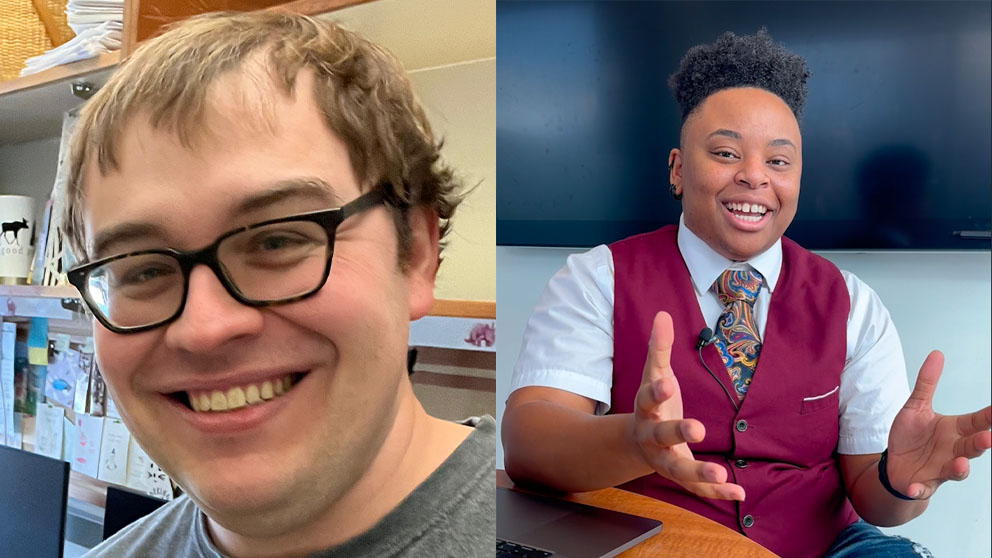 (l to r) Michael MacLean and Lisa Wren
(l to r) Michael MacLean and Lisa Wren
The JAX Scholars Program supports outstanding postdoctoral associates as they pursue better understanding of mammalian biology and human disease. The Jackson Laboratory is proud to announce Lisa Wren, Ph.D., and Michael MacLean, Ph.D., as the 2023 JAX Scholars.
“All of our postdocs make meaningful contributions to the advancement of our understanding of the complex diseases impacting our family, friends, and neighbors,” says Meredith Theeman, Program Director of Postdoc and Predoc Education. “We are delighted to highlight the innovative research of Dr. MacLean and Dr. Wren, who are excellent examples of driven, curious scientists whose presence in the lab energizes their colleagues.”
Both Wren and MacLean observed gaps in their respective fields of interest. By developing thought-provoking questions and implementing new experimental designs, they have established themselves as future leaders in biomedical and biological research.
A scientist from scratch
Michael MacLean, Ph.D., is proud to call JAX home, although he never saw himself becoming a scientist. After taking a couple of years off in high school, MacLean eventually found himself drawn to the culinary arts. While mastering delicious dishes, MacLean decided his taste for nutrition was really a hunger for problem solving.
“I was really fascinated with understanding how things happen,” says MacLean. “Those introductory level classes to biology made me want to know more.”
MacLean is currently part of the Howell Laboratory investigating microglia, a rather mysterious type of immune cell located throughout the central nervous system, including in the retina and the brain. MacLean describes the microglia as the first line of defense responsible for cleaning up any debris generated by pathogens or wayward cellular processes.
Microglia are thought to play a role in the onset and progression of neurodegenerative diseases such as Alzheimer’s disease, as well as diabetic retinopathy and glaucoma. MacLean is particularly interested in how microglia contribute to these diseases with the added health stressors of obesity and diabetes. His most recent finding indicates there is hope for better therapies for diabetic retinopathy patients.
“We have found signs of diabetic retinopathy in a mouse model of metabolic syndrome. This is exciting as models for diabetic retinopathy are quite limited,” says MacLean. “We hope to further develop models to identify targets for treatment and to provide insight into how microglia influence this particular disease.”
MacLean continues to find inspiration from scientific literature and from bouncing ideas off his JAX colleagues. He is grateful to have the support to cook up some solutions for often overlooked stressors of human disease.
“At JAX, we have access to resources not necessarily accessible at other institutions, such as the diverse mouse strains,” he says. “Dr. Howell is a great mentor who helps foster creative new ideas, and I am looking forward to delving more into my research in the coming year.”
Heart of the community
Lisa Wren, Ph.D., has been interested in the cardiovascular system since the age of 18. With her early-stage love for the cardiovascular system, Wren began performing research in cardiac electrophysiology during her summer and winter breaks throughout college. Wren originally anticipated pursuing medical school to become a cardiologist, but found her heart was being pulled towards research.
“While I enjoyed my time shadowing clinicians and working with patients, I found a love for the freedom to create scientific solutions to some of life’s toughest and most complex questions,” says Wren.
As a member of the Hinson Lab, Wren is part of a research group investigating the mechanisms of heart failure and potential therapies to treat it. Wren’s studies particularly focus on the cellular mechanisms of heart failure and inherited cardiovascular disorders. Through advanced proteomic techniques, she describes her work as unlocking how proteins interact with each other. Her research helps determine which interactions occur in healthy hearts versus those that contribute to heart disease.
“We are trying to understand how protein interactions change when a patient develops heart disease,” says Wren. “We use dilated cardiomyopathy and heart failure models to determine which proteins and their respective genes could be targeted for therapies down the road.”
Wren believes in the importance of scientific literacy and community outreach. As an active firefighter and emergency medical technician in South Windsor, Connecticut, she is heavily influenced by her experiences at the forefront of serious cardiovascular events.
“You can see how these cardiac events affect a patient and their family,” says Wren. “There is a need to spread information about heart health and the little changes you can do in your day to day that will improve your overall cardiac health. Being out there in the community really makes a difference in people’s lives, and that is what I care about.”
Staying at JAX is becoming an important part of Wren’s future career plan. She relishes the changes coming to the research field and patient care, specifically the impact genetic tools will soon make in the clinic. Wren finds hope in her work as the research community reaches the point when it is able to usher more effective therapies to the clinic.
“When I found Dr. Hinson, I was able to pursue the next steps of my cardiovascular work,” she says. “It has been a wonderful experience working with him and other members of the lab. The environment and resources here have made JAX the perfect match for me.”
Learn more about the 2023 JAX Scholars in the video profiles below.